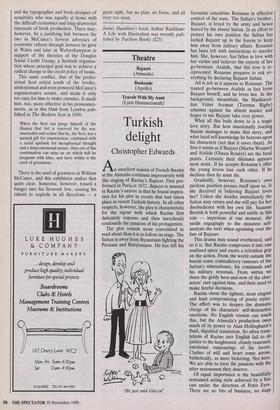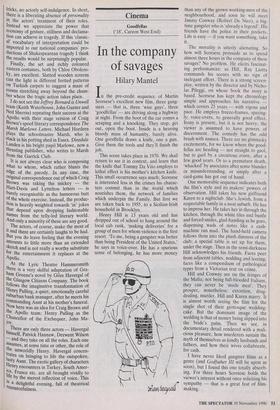Theatre
Travels With My Aunt (Lyric Hammersmith)
Bajazet (Almeida)
Bookends (Apollo)
Turkish delight
Christopher Edwards
n excellent season of French theatre at the Almeida continues impressively with this staging of Racine's Bajazet. First per- formed in Path in 1672, Bajazet is unusual in Racine's oeuvre in that he found inspira- tion for his plot in events that had taken place in recent Turkish history. In all other respects, however, the play is characteristic for the rigour with which Racine first delicately exposes and then mercilessly confounds the passions of his protagonists.
The plot sounds more convoluted to read about than it is to follow on stage. The Sultan is away from Byzantium fighting the Persians and Babylonians. He has left his He just said Gazzaf favourite concubine Roxanne in effective control of the state. The Sultan's brother, Bajazet, is loved by the army and hence feared by the absent Sultan. In an effort to protect his own position the Sultan has locked Bajazet up in the harem to keep him away from military affairs. Roxanne has been left with instructions to murder him. She, however, has fallen in love with her victim and believes the reports of her go-between, Atalide, that this love is re- ciprocated. Roxanne prepares to risk ev- erything by declaring Bajazet Sultan. All is not as it appears to Roxanne. The trusted go-between Atalide in fact loves Bajazet herself, and he loves her. In the background, meanwhile, the Machiavel- lian Vizier Acomat (Terence Rigby) schemes against his absent master and hopes to see Bajazet take over power. What all this boils down to is a tragic love story. But how emotionally riveting Racine manages to make that story, and what lucid self-knowledge he bestows upon his characters (not that it saves them). At first it seems as if Bajazet (Martin Wenner) and Atalide (Olwen Rouere) are the focal points. Certainly their dilemma appears most acute. If he accepts Roxanne's offer the young lovers lose each other. If he declines then he must die.
Gradually, however, Roxanne's own perilous position presses itself upon us. Is she deceived in believing Bajazet loves her? Unless she decides immediately the Sultan may return and she will pay for her disobedience with her own life. Suzanne Bertish is both powerful and subtle in this role — imperious at one moment, she yields engagingly to the minutest self- analysis the next when agonising over the fate of Bajazet. This drama may sound overheated, and so it is. But Racine compresses it into one confined space and exerts a relentless griP on the action. From the world outside the harem come contradictory rumours of the Sultan's whereabouts, his commands and his military reversals. From within we share the giddy here-and-now of the char- acters' race against time, and their need to make fateful decisions.
Racine chose the tightest, most elegant and least compromising of poetic styles. The effect was to deepen the dramatic charge of his characters' self-destructive emotions. No English version can touch this, but the Almeida's production owes much of its power to Alan Hollinghurst's fluid, dignified translation. So often trans- lations of Racine into English fail to do justice to the heightened, closely reasoned, emotional outpourings of his lovers. Clashes of will and heart come across, bathetically, as mere bickering. Not here. We are able to treat the passions with the utter seriousness they deserve. Of equal importance is the beautifully restrained acting style achieved by a fine cast under the direction of Peter Eyre. There are no bits of business, no stage tricks, no actorly self-indulgence. In short, there is a liberating absence of personality in the actors' treatment of their roles.
Instead we appreciate the power that economy of gesture, stillness and declama- tion can achieve in tragedy. If this 'classic- al' vocabulary of interpretation could be imported to our national companies' pro- ductions of Shakespearean tragedy I think the results would be surprisingly popular. Finally, the set and richly coloured eastern costumes, both by Chloe Obolens- ky, are excellent. Slatted wooden screens cast the light in different fretted patterns on Turkish carpets to suggest a maze of rooms stretching away beyond the cham- ber where the tragic action takes place. I do not see the Jeffrey Bernard is Unwell team (Keith Waterhouse, John Gunter and Ned Sherrin) repeating their success at the Apollo with their stage version of Craig Brown's spoof literary correspondence The Marsh Marlowe Letters. Michael Hordem Plays the schoolmaster Marsh, who is stuck in his potting shed in Essex. Dinsdale Landen is his bright pupil Marlowe, now a thrusting publisher, who writes to Marsh from the Garrick Club.
It is not always clear who is composing what to whom, which rather blunts the edge of the parody. In any case, the original correspondence out of which Craig Brown was taking the mickey — the Hart-Davis and Lyttelton letters — is barely recognisable as the humorous butt of the whole exercise. Instead, the produc- tion is heavily weighted towards 'in' jokes that depend upon dropping fashionable names from the telly-led literary world. And only a minority of these are any good. The actors, of course, make the most of it and there are certainly laughs to be had. But you do leave feeling that the evening amounts to little more than an extended sketch and is not really a worthy substitute for the entertainment it replaces at the Apollo.
At the Lyric Theatre Hammersmith there is a very skilful adaptation of Gra- ham Greene's novel by Giles Havergal of the Glasgow Citizens Company. The book follows the imaginative transformation of Henry Pulling, a quiet, emotionally careful suburban bank manager, after he meets his commanding Aunt at his mother's funeral. Now here was an idea for Craig Brown and the Apollo team: Henry Pulling as the Chancellor of the Exchequer, John Ma- jor.
There are only three actors — Havergal himself, Patrick Hannaw, Derwent Wilson and they take on all the roles. Each one assumes, at some time or other, the role of the unworldly Henry. Havergal concen- trates on bringing to life the outspoken, lusty Aunt. The exotic gallery of characters Henry encounters in Turkey, South Amer- France etc. are all brought vividly to tile by the merest inflection of voice. This is a delightful evening, full of theatrical resourcefulness.



































































 Previous page
Previous page